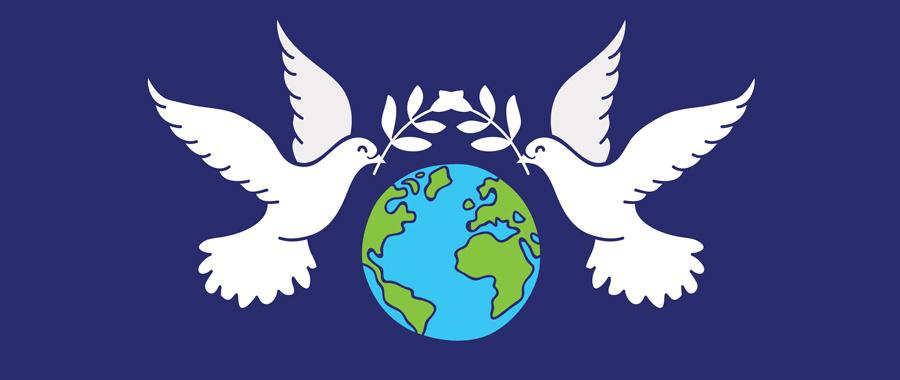In today’s world, where conflicts proliferate and discord seems omnipresent, the quest for peace has become more crucial than ever. The Bahá’í Faith, a world religion established in the 19th century, advocates profound principles that offer transformative guidance towards achieving peace. At the heart of Bahá’í teachings lies a pragmatic approach encapsulated in “The Bahá’í Prescription for Peace,” articulated through four practical steps that serve as a roadmap to fostering harmony among individuals and communities. These steps are not merely theoretical; they are actionable strategies designed to engender understanding and promote unity.
Step 1: Cultivating the Spirit of Universal Oneness
The first step in the Bahá’í Prescription for Peace is the profound recognition of the oneness of humanity. This tenet emphasizes that all individuals, regardless of race, nationality, or social status, are members of one human family. The implications of this principle are extensive, necessitating a paradigm shift in how individuals perceive their relationships with others. The understanding that every person possesses an inherent worth fosters a culture of respect and compassion.
To embody this principle, individuals are encouraged to engage in practices that promote inclusivity. This can be realized through education, dialogue, and celebratory interfaith events that illustrate the rich tapestry of human culture. Promoting understanding through shared experiences helps dismantle prejudices and biases, which often serve as barriers to peace. By integrating the idea of universal oneness into daily life, individuals can contribute significantly to cultivating a more harmonious global society.
Step 2: Promoting Justice and Equality
The second step emphasizes justice and equality as foundational elements for achieving sustainable peace. Inequity breeds resentment, and as such, Bahá’í teachings advocate for the elimination of all forms of prejudice. This involves not only recognizing systemic injustices but actively working towards their redress. The individual responsibility to uphold justice is paramount; it calls for a commitment to ensuring that fair treatment is extended to all, particularly marginalized groups.
Actions to promote justice can manifest in various forms. Advocacy for equitable policies, volunteering for organizations that support the underprivileged, and fostering discussions around inclusion and diversity within communities are just a few examples of how individuals can make impactful contributions. Additionally, the Bahá’í teachings posit that peace cannot be attained through force or coercion; rather, it must be established through compassionate engagement and the unwavering pursuit of equitable solutions for all.
Step 3: Breeding Unity through Communication
The integral role that communication plays in fostering peace cannot be overstated. The third step in the Bahá’í Prescription for Peace calls for the cultivation of effective communication skills aimed at bridging divides. Miscommunication and misunderstandings often exacerbate conflicts, thus instigating cycles of discord. By fostering respectful dialogue, individuals can foster an atmosphere of mutual understanding and trust.
To achieve this, one must approach conversations with an open mind and heart, actively listening to diverse viewpoints. Engaging in constructive dialogue requires not only expressing one’s thoughts but also valuing the insights of others. Modalities such as facilitated discussions, conflict resolution workshops, and community forums serve as platforms for encouraging the sharing of narratives, fostering empathy, and underscoring our shared humanity.
Moreover, the role of digital communication in promoting unity should not be overlooked. In an age where social media has both the potential to connect and divide, harnessing technology for positive discourse is essential. Initiatives that emphasize respectful communication can effectively leverage online platforms to encourage widespread dialogues that champion peace-building.
Step 4: Engaging in Service to Humanity
The final step encapsulates the essence of service to humanity, emphasizing that sincere acts of altruism can significantly contribute to societal peace. Service is a unifying force that transcends individual differences, fostering collaboration and solidarity among community members. Bahá’í teachings articulate that true fulfillment comes from contributing to the betterment of society.
Engagement in community service offers myriad avenues through which individuals can enact this principle. From organizing clean-up drives to tutoring underprivileged children, every act of service contributes to the collective welfare and reinforces communal bonds. Furthermore, service should be approached with genuine intention, seeking to uplift others without expectation of personal gain. This commitment to selfless service engenders a spirit of cooperation, alleviating societal tensions and nurturing a sense of belonging.
Conclusion: A Holistic Approach to Peace
The Bahá’í Prescription for Peace, reflecting on the principles of universal oneness, justice, communication, and service, presents a comprehensive approach to fostering peace in a fractured world. Each step is interlinked, creating a cohesive framework that not only addresses immediate needs but also establishes long-term strategies for sustainable peace. By committing to these principles, individuals and communities are empowered to forge paths toward reconciliation and harmony, ultimately contributing to a more peaceful and united global society.
In times of strife, let us reflect upon these teachings, engaging in practices that elevate our collective consciousness and transcend divisions. The realization of peace begins with us, guided by the profound insights of the Bahá’í teachings.
